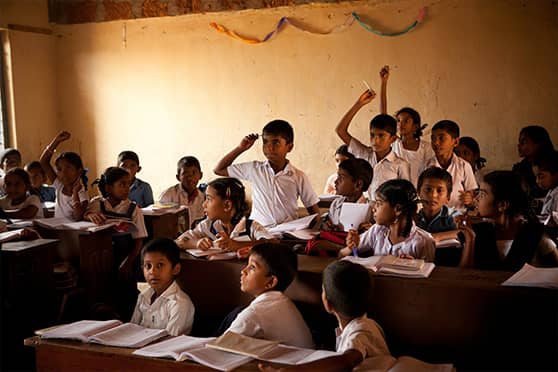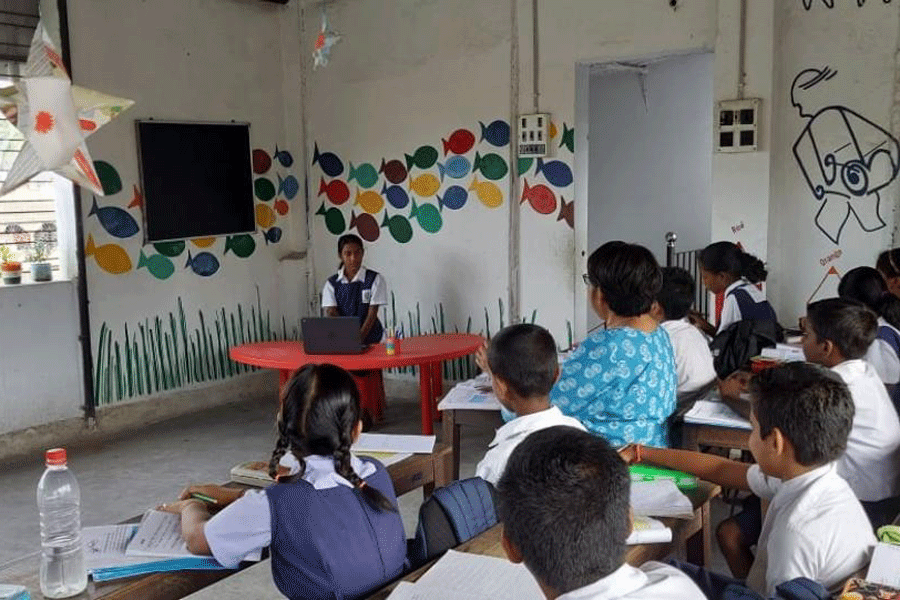If a state wants to avail central funds to upgrade some of its government schools under a recently launched scheme, it must prefix “PM-SHRI” to the names of these schools, documents accessed by The Telegraph show.
Bengal is among six states that are yet to join the PM Schools for Rising India (PM-SHRI) scheme. The other five are Tamil Nadu, Odisha, Bihar, Delhi and Kerala.
Officials in two of these states said their political executives were opposed to prefixing “PM-SHRI” to the names of their schools, particularly as the scheme requires the states to bear 40 per cent of the cost.
Odisha and Bengal are already embroiled in a fight with the Centre over the sharing of credit for houses built under the PM Awas Yojana. These states — which are shouldering 40 per cent of the financial burden — have pasted their own logos on the houses along with the Centre’s, attracting objections from the Union government.
The Union cabinet had in September 2022 approved the PM-SHRI scheme, which aims to upgrade up to 14,597 existing state government schools that would later mentor other schools in their neighbourhood. A block can get a maximum of two such schools while some blocks may not get any.
Under the scheme, every state has to sign a memorandum of understanding (MoU) with the Centre to receive the grants.
“Name of the selected school shall be prefixed with PM SHRI schools,” says a provision in the MoU, a copy of which this newspaper has obtained through an RTI application.
“No change shall be undertaken thereafter, by the state for these schools, as these schools are to be developed as PM SHRI schools for providing quality education.”
Earlier this year, Union education minister Dharmendra Pradhan wrote to all the chief ministers requesting them to get their states to sign up for the scheme. So far, the ministry has received proposals from the states to upgrade about 9,000 schools. They are being processed.
The projected expenditure for the scheme is Rs 27,360 crore between 2022-23 and 2026-27, with the states bearing 40 per cent of the cost. After 2026-27, the states have to shoulder the full expenses while continuing to follow the norms set under the scheme.
The PM-SHRI schools will have “green buildings” with solar panels, LED lights and nutrition gardens. They will practise proper waste management and water conservation while promoting awareness of sustainable lifestyles, the MoU says.
The document is, however, vague on the academic side of the upgrade. It says the pupils would be exposed to “experiential learning”, that is, learning through activities. It adds that the focus will be on the learning outcomes of every child in every grade, and that conceptual understanding will be assessed.
An official of the Odisha government said the state had begun its own “5T” schools that were equally good.
“Odisha already has a scheme called Vision 5T to upgrade its schools. Under PM-SHRI, the central government wants to take full credit since the schools will be named ‘PM-SHRI’, but the states will still be contributing 40 per cent of the funds,” the official said.
The MoUs also require the states to commit to implementing all the provisions of the National Education Policy(NEP) in the PM-SHRI schools. Tamil Nadu has from the beginning revolted against the NEP, saying it promotes Hindi and Sanskrit. The state has setup a committee to frame its own education policy.
The new Congress government in Karnataka too has said it would have its own state education policy. John Brittas, a CPM Rajya Sabha MP from Kerala, said that most of the southern states did not need the PMSHRI because they had already upgraded their schools. “Kerala crossed the threshold benchmark earlier. These kinds of central-sponsored schemes are tailored for the backward states,” he said. “India is a vast country. A one-size-fits-all approach will not succeed.”











